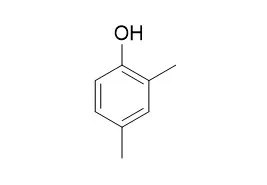| In vitro: |
| Pesticide Biochemistry & Physiology, 2006, 85(3):174-180. | | 2,4-D and MCPA and their derivatives: Effect on the activity of membrane erythrocytes acetylcholinesterase (in vitro).[Reference: WebLink] |
METHODS AND RESULTS:
The effect of 2,4-dichlorophenoxyacetic acid (2,4-D), 4-chloro-2-methylphenoxyacetic acid (MCPA), and their derivatives: phenol, 2,4-dichlorophenol (2,4-DCP), 2,4-Dimethylphenol (2,4-DMP), and catechol on the activity of acetylcholinesterase (AChE, EC 3.1.1.7) in human erythrocytes was studied. Phenol, MCPA, and 2,4-DMP did not significantly change AChE activity in human erythrocytes (in vitro). Decrease of AChE activity was observed under the highest applied dose of 2,4-D—500 and 1000 ppm. Decrease of AChE activity exposed to 2,4-DCP and catechol was noted and depended on the doses of applied compounds. The relationship between activities and substrate concentrations (curves) was analyzed for reactions of acetylcholinesterase. Catalytic constants Km and Vmax were calculated from the Michaelis curve. Statistically significant decrease of Vmax and Km was observed in the activity of AChE incubated with 2,4-DCP and catechol, revealing mixed inhibition type of AChE inhibition (this compound may affect not only on enzyme but also on complex ES as well). 2,4-D decreases Vmax but do not change Km value, what reveals non-competitive type of AChE inhibition by this compounds. Non-competitive inhibition does not depend on the substrate concentrations but only on the inhibitor concentration and its Ki value, characterizes the affinity of inhibitors towards enzyme.
CONCLUSIONS:
In conclusion, changes of AChE activity upon 2,4-D, 2,4-DCP, and catechol are the consequences of direct interactions between compounds and the enzyme and indirect via membrane modification and increase of Reactive Oxygen Species. |
|






 Cell. 2018 Jan 11;172(1-2):249-261.e12. doi: 10.1016/j.cell.2017.12.019.IF=36.216(2019)
Cell. 2018 Jan 11;172(1-2):249-261.e12. doi: 10.1016/j.cell.2017.12.019.IF=36.216(2019) Cell Metab. 2020 Mar 3;31(3):534-548.e5. doi: 10.1016/j.cmet.2020.01.002.IF=22.415(2019)
Cell Metab. 2020 Mar 3;31(3):534-548.e5. doi: 10.1016/j.cmet.2020.01.002.IF=22.415(2019) Mol Cell. 2017 Nov 16;68(4):673-685.e6. doi: 10.1016/j.molcel.2017.10.022.IF=14.548(2019)
Mol Cell. 2017 Nov 16;68(4):673-685.e6. doi: 10.1016/j.molcel.2017.10.022.IF=14.548(2019)